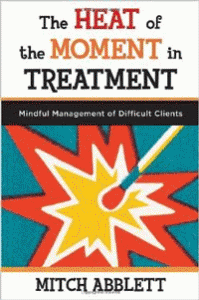“The Heat of the Moment in Treatment: Mindful Management of Difficult Clients”

“The Heat of the Moment in Treatment: Mindful Management of Difficult Clients”
By Mitch Abblett
W.W. Norton & Company, Inc.
New York, N.Y. 2013
Book addresses mindfulness with difficult clients
Reviewed by Helen S. Hwang, Ph.D. MPH
Like Greek yogurt, mindfulness seems to be everywhere these days. In fact, it is the fastest growing area of mental health and a quick Google search leads you directly to mindfulness therapy techniques, training workshops, certifications and even its application to forensic mental health. Moreover, Amazon has more than 1,000 books on this popular topic. Yet there are few books on mindfulness as applied to the generically “difficult client.”
In “The Heat of the Moment in Treatment,” Mitch Abblett honestly addresses the patient that providers can feel a “malicious mix of hatred, rage and disgust” for with acceptance based mindfulness exercises and practice. Instead of pointing the finger at the client, Abblett states that the therapist has a significant part in the co-creation of these difficult encounters and experiences.
Part I of the book focuses on developing an understanding of the therapist’s unique pattern of reactivity. For example, a chapter is devoted to mindfully tuning into (noticing without judging) the core emotional scripts we automatically play out in all of our relationships including the therapeutic one.
According to Abblett, scripts that come from derivatives of our own histories such as: “I have to save him or her” or “She is trying to take advantage of me” cloud perspective and prevent us from being more available to therapeutic intention.
So how does the author guide us to these moments of contemplative understanding from which to take nonreactive, centered action?
Throughout the entire book (which Abblett states is actually a workbook), there are exercises that begin with “Lean In.” I appreciate the gentle, warm nudge I hear in “Lean In.”
An exercise that I found helpful with a particularly vile client was a guided visualization on finding compassion. In this exercise, Abblett encourages us to find a comfortable seated position from which to notice thoughts, emotions, and sensations arise and fall away.
Then, one after the other, you will approach two different children in a field, one sickly and dying of cancer and the other, healthy but shouting the most hateful slurs as well as spitting on you. You then make a distinction between the “empathy easy” versus the “empathy hard” child and write out reactions to questions such as: “Is one of these children truly more deserving of compassion than the other?” and “Did the second child choose to be so full of hate?”
I found exercises like these extremely helpful in re-centering myself, bringing me to a place that Abblett calls “compassionate attuned detachment.”
Part II focuses on specific applications of skills during those heated moments. I found the chapter on the critical role of authenticity compelling, in that Abblett encourages us to “Lean In” and examine how authentically we engage with others. He asks, “How real are you?” Different from self-disclosure, something typically good occurs when engagement occurs between the authentically attuned to aspects of each person which he demonstrates with compelling clinical vignettes and actual process interventions.
Although Abblett courageously shares gory details about treatments, such as having been slapped in the leg with a pee-soaked towel, I would have appreciated knowing more about how he came to his own mindfulness practice and how he manages to sustain it.
Entertaining, lively and incredibly resourceful, this book is highly recommended and applicable to clinicians who already have a mindfulness based practice and want to enhance it or for those like me, who have always been curious and want to know how to begin.
Helen Hwang, Ph.D., MPH is a licensed psychologist in private practice in Boston, Mass. She is a candidate at the Massachusetts Institute for Psychoanalysis.
Learn more about the book: The Heat of the Moment in Treatment: Mindful Management of Difficult Clients (Norton Professional)
